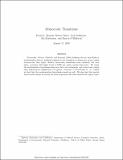| dc.contributor.author | Epstein, David | |
| dc.contributor.author | Bates, Robert | |
| dc.contributor.author | Goldstone, Jack | |
| dc.contributor.author | Kristensen, Ida | |
| dc.contributor.author | O'Halloran, Sharyn | |
| dc.date.accessioned | 2009-09-28T15:27:22Z | |
| dc.date.issued | 2006 | |
| dc.identifier.citation | Epstein, David L., Robert Bates, Jack Goldstone, Ida Kristensen, and Sharyn O'Halloran. 2006. Democratic transitions. American Journal of Political Science 50(3): 551-569. | en_US |
| dc.identifier.issn | 0026-3397 | en_US |
| dc.identifier.issn | 0092-5853 | en_US |
| dc.identifier.uri | http://nrs.harvard.edu/urn-3:HUL.InstRepos:3322248 | |
| dc.description.abstract | Przeworski et al. (2000) challenge the key hypothesis in modernization theory: political regimes do not transition to democracy as per capita incomes rise, they argue. Rather, democratic transitions occur randomly, but once there, countries with higher levels of GDP per capita remain democratic. We retest the modernization hypothesis using new data, new techniques, and a three-way rather than dichotomous classification of regimes. Contrary to Przeworski et al. (2000) we find that the modernization hypothesis stands up well. We also find that partial democracies emerge as among the most important and least understood regime types. | en_US |
| dc.description.sponsorship | African and African American Studies | en_US |
| dc.description.sponsorship | Government | en_US |
| dc.language.iso | en_US | en_US |
| dc.publisher | Blackwell Publishing | en_US |
| dc.relation.isversionof | http://dx.doi.org/10.1111/j.1540-5907.2006.00201.x | en_US |
| dc.relation.hasversion | http://club.fom.ru/books/democr_tr.pdf | en_US |
| dash.license | LAA | |
| dc.title | Democratic Transitions | en_US |
| dc.type | Journal Article | en_US |
| dc.description.version | Author's Original | en_US |
| dc.relation.journal | American Journal of Political Science | en_US |
| dash.depositing.author | Bates, Robert | |
| dc.date.available | 2009-09-28T15:27:22Z | |
| dc.identifier.doi | 10.1111/j.1540-5907.2006.00201.x | * |
| dash.contributor.affiliated | Bates, Robert | |


